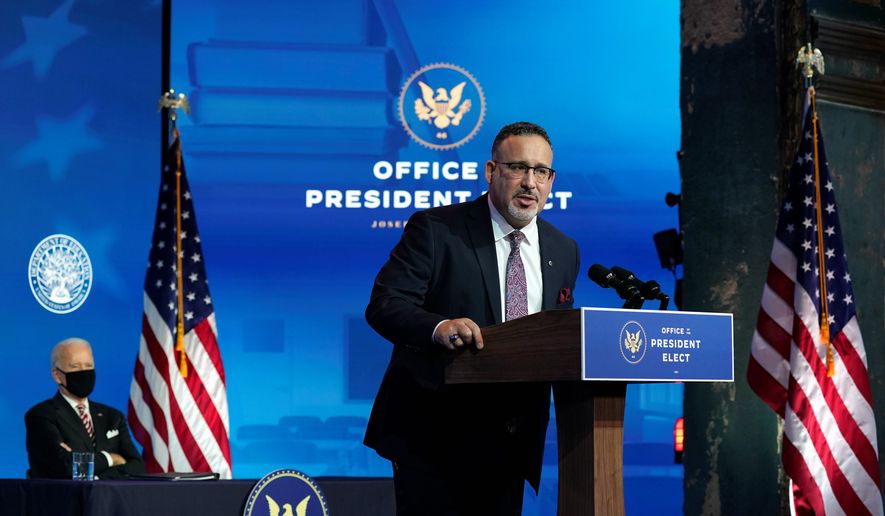President-elect Joseph R. Biden introduced Miguel Cardona as his pick for education secretary Wednesday, declaring the public schools chief from Connecticut to be “as American as apple pie and rice and beans.”
The multicultural reference underscored Mr. Cardona’s Hispanic heritage and Mr. Biden’s determination to have the most diverse Cabinet in U.S. history.
The pick also signaled a dramatic pivot from the Trump administration in K-12 education.
“In this critical moment in our nation’s history, it’s essential that there is an educator serving as secretary of education,” Mr. Biden said. “I want to make that clear again: an educator, someone who has taught in the classroom, comes out of the classroom.”
His public schools background means Mr. Cardona will “be ready from Day One,” Mr. Biden said.
Mr. Cardona, 45, spent his entire life in public schools and most recently held the position of education commissioner in Connecticut.
The son of a Meriden, Connecticut, police officer, Mr. Cardona assumed his latest duties in February, and consequently, most of his short tenure in charge was devoted to dealing with the coronavirus pandemic. Mr. Cardona took an aggressive stance in favor of keeping schools open, a position that put him at odds with the powerful teachers unions.
“There is no substitute for in-classroom learning,” Mr. Cardona said in a recent Connecticut radio interview. “The issue of attendance and enrollment and engagement disproportionately affects our urban centers that are a little more dense or have greater need.”
Despite that stance, it was the teachers unions who were most pleased with Mr. Biden’s nomination.
“His commitment to public education, to our students and to listening to and respecting the wisdom of educators will be crucial as the Biden administration helps school districts across America meet the social, emotional and instructional needs of students and moves to safely, responsibly and equitably reopen school buildings,” said Randi Weingarten, president of the American Federation of Teachers.
Before joining the administration of Gov. Ned Lamont, a Democrat, Mr. Cardona rose to the top of the Meriden public school district, which consists of 12 schools and roughly 7,500 students, 70% of whom are minorities, according to public records. The district ranks in the bottom half of the state in graduation rates and proficiency in math and reading.
Even some of those who favor more choice in the public education landscape embraced Mr. Cardona’s position on keeping schools open during the pandemic, a position shared by the American Pediatric Association.
“President-elect Joe Biden’s choice is good news for the millions of parents and students whose fates have been so derailed by the coronavirus this year,” said Jeanne Allen, founder the chief executive officer of the Center for Education Reform. “Had Biden picked a union leader or equivalent, it would have been akin to an act of war on the progress of the last three decades of pushing power to parents, and on those who have fought to get their kids educated this year.”
Teachers unions in many states vigorously fought to keep schools closed during the pandemic, insisting the classroom environment poses a health threat to education professionals.
“Cardona did a commendable job because there was a huge push from the unions to keep schools closed in the fall,” said Marc Fitch, a Hartford-based researcher who has tracked public education in Connecticut for the Yankee Institute.
On the school choice issue, however, Mr. Cardona will be an ally of teachers unions and stand in stark contrast to outgoing Education Secretary Betsy DeVos.
Mrs. DeVos suffered harsh criticism from the unions and other supporters of the current public school system. She and President Trump have been strong proponents of vouchers and charter schools, which teachers unions view as a threat to the public school model.
In February 2019, Mrs. DeVos created an Education Freedom Scholarship, which is now a $5 billion initiative offering tax credits to people and businesses that provide money to pay for scholarships that provide alternatives to parents and students.
The AFT and the National Education Association, the two largest teachers unions, oppose all vouchers, scholarships and other methods of school choice.
The idea that the Biden administration would take money that might have been earmarked for school choice and pour it back into the existing public school structure delighted unions.
“With his experience as a student, fourth-grade teacher, principal, assistant superintendent and commissioner in Connecticut, Dr. Cardona — a former AFT member — will transform the Education Department to help students thrive, a reversal of the DeVos disaster of the last four years,” Ms. Weingarten’s statement read.
But the system Mr. Cardona oversaw offers many examples of how school choice has benefited students, Mr. Fitch said.
“School choice has been one of the only bright spots,” he said of a system that spends $24,000 a year for students in many poorly performing urban schools.
“There is a huge achievement gap here,” Mr. Fitch said. “Probably 95% of the public schools are great by national standards. But in urban areas, the schools are just terrible.”
• James Varney can be reached at jvarney@washingtontimes.com.




Please read our comment policy before commenting.